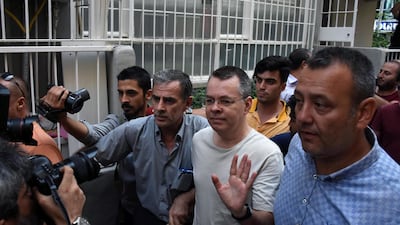In an unprecedented escalation, Washington has sanctioned two Turkish ministers involved in the detention of US pastor Andrew Brunson in the one of the biggest crises between the two Nato allies in recent years.
Tensions have soared over Turkey's detention on terror charges of the American pastor, who was first held in October 2016 and was moved to house arrest last week.
One week after US President Donald Trump and Vice President Mike Pence threatened Ankara with sanctions if Mr Brunson was not released, the Treasury’s Office of Foreign Assets Control (OFAC) designated Turkey’s Minister of Justice Abdulhamit Gul and Minister of Interior Suleyman Soylu, and accused them of “leading roles in the organisations responsible for the arrest and detention of Pastor Brunson”.
He is under house arrest facing espionage charges. He is accused of acting on behalf of two groups deemed by Turkey to be terrorist organisations - the movement led by US-based Muslim preacher Fethullah Gulen who Ankara says was behind the 2016 coup bid and the outlawed Kurdistan Workers' Party (PKK).
Turkey was on Thursday drawing up retaliatory measures to the US sanctions.
The two Turkish officials were targeted under the Global Magnitsky Act and in accordance with Executive Order 13818, "Blocking the property of persons involved in serious human rights abuse or corruption".
“Pastor Brunson’s unjust detention and continued prosecution by Turkish officials is simply unacceptable,” said Treasury Secretary Steven Mnuchin.
Mr Pence weighed in on Twitter, saying the "harsh economic sanctions on Turkey [would] continue until President Erdogan and the Turkish government release Pastor Brunson and return this innocent man of faith to the US".
His language was immediately echoed by President Donald Trump, who had enjoyed a relatively warm relationship with Erdogan and was even reported to have "fist-bumped" the Turkish president at a Nato summit last month.
Turkish Foreign Minister Mevlut Cavusoglu, who is set to meet US Secretary of State Mike Pompeo in the next few days, said the move "will not go without response".
The Senate voted on Wednesday to pass a $716 billion (Dh2,630bn) National Defence Authorisation Act that would that temporarily blocks the delivery of F-35 jets to Turkey.
The Senate voted 87-10 approving the act, which includes a provision to force the Pentagon to halt the transfer until it can provide a report in 90 days to Congress addressing key issues of Turkish behaviour, paticularly its military deals with Russia and detention of Mr Brunson.
On Wednesday, Turkey's Foreign Ministry said: "An equivalent response to this aggressive attitude will be given without delay. There is no doubt that the decision, which disrespectfully intervenes in our judicial system, stands in contrast to the essence of our relations and will seriously damage the constructive efforts made in order to resolve problems between the two countries."
The standoff appears to be one of the most serious crises between Turkey and the United States in modern history, along with the rows over the 1974 Turkish invasion of Cyprus and the 2003 US-led invasion of Iraq.
The sanctions rattled financial markets with the Turkish lira hitting five to the dollar for the first time in history. The currency has lost four percent against the dollar in the last week alone.
Turkish Finance Minister Berat Albayrak, who is Erdogan's son-in-law, insisted the impact on the economy would be "limited".
Aaron Stein, a senior fellow at the Atlantic Council's Rafik Hariri Centre for the Middle East, told The National that the new sanctions "are obviously a big deal, but these seem calibrated to try and limit damage to the Turkish economy, while still making a point".
_______________
Read more:
Turkish lira falls to record low as US sanctions hit
Turkish court rejects US pastor's appeal
Top US general visits Ankara amid strained ties
_______________
“The US is trying to thread the needle here and escalate with Turkey by targeting officials associated with the Brunson case” Mr Stein said. “The point is to, once again, signal that there are consequences for the imprisonment of Americans.”
Aykan Erdemir, a former Turkish parliamentarian and expert at the Foundation for Defence of Democracies, told The National that the move is "unprecedented".
“The US sanctions against ministers of a Nato member are unprecedented. It shows how strained bilateral relations are between Washington and Ankara.”
He blamed Mr Erdogan’s “hostage diplomacy” behind the deterioration.
Mr Erdemir saw the most significant impact of today’s sanctions “will be on Turkey’s economy” in “eroding investor confidence in Turkey and exacerbate devaluation and capital flight”.
US Congress is also considering two legislations to punish Turkey, one that would restrict international loans and another attached to the defence authorisation that would block F-35 deliveries to Ankara.
Ankara and Washington are at odds over American support for a Kurdish militia in Syria and the United States is extremely wary over Turkey's growing cooperation with Russia and its deal to buy Russian air defence systems.
Two Turkish employees of US consulates in Turkey are also currently in jail on terror charges and another is under house arrest, while several Americans have been caught up in the crackdown that followed the failed coup.
Turkey is meanwhile furious the US has failed to extradite Mr Gulen, who lives in rural Pennsylvania, to face trial over the failed coup bid.
The sanctions came as Nato Supreme Allied Commander Europe General Curtis Scaparrotti arrived in Turkey for a visit aimed at easing tension between Ankara and Washington, and co-ordinating efforts in Northern Syria and the city of Manbij. The senior US general in Europe was on Thursday holding talks with Turkish military officials in Ankara but there was no indication the Brunson case would be raised.
The court trying Brunson has repeatedly refused to allow him to go free. The next hearing is October 12 with the pastor facing 35 years in jail if convicted.

